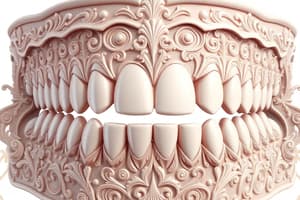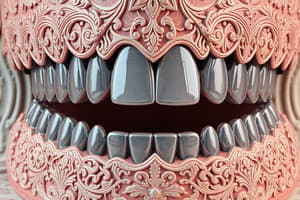Podcast
Questions and Answers
What is the primary purpose of using occlusion blocks in denture fabrication?
What is the primary purpose of using occlusion blocks in denture fabrication?
- To reduce the overall weight of the denture
- To establish and maintain the vertical dimension of occlusion (correct)
- To enhance the aesthetic appearance of the denture
- To aid in the selection of shade for denture teeth
Which is NOT a requirement of a trial denture base?
Which is NOT a requirement of a trial denture base?
- Easy to construct
- Heavily textured surface for grip (correct)
- Dimensionally stable with minimal warpage
- Accurately adapted to the cast with proper extensions
What materials are used in the fabrication of the record base?
What materials are used in the fabrication of the record base?
- Polyvinyl siloxane
- Self-curing epoxy resin
- Autopolymerizing acrylic resin (correct)
- Thermoplastic polyurethane
What is the first step in the process of preparing the master cast for record base fabrication?
What is the first step in the process of preparing the master cast for record base fabrication?
Why is the master cast soaked in room temperature water before fabricating the record base?
Why is the master cast soaked in room temperature water before fabricating the record base?
How many layers of tinfoil substitute are applied to the cast?
How many layers of tinfoil substitute are applied to the cast?
Which area of the maxillary cast is primarily considered when blocking out undercuts or irregularities?
Which area of the maxillary cast is primarily considered when blocking out undercuts or irregularities?
What is an essential characteristic of a trial denture base to ensure convenience during procedure?
What is an essential characteristic of a trial denture base to ensure convenience during procedure?
What is the primary purpose of occlusion rims in denture fabrication?
What is the primary purpose of occlusion rims in denture fabrication?
What is the recommended width of occlusal rims in the anterior region?
What is the recommended width of occlusal rims in the anterior region?
How far anterior should the labial surface of the maxillary occlusion rim be from the midline of the incisive papilla?
How far anterior should the labial surface of the maxillary occlusion rim be from the midline of the incisive papilla?
What important information must be communicated to patients regarding record bases and occlusion rims?
What important information must be communicated to patients regarding record bases and occlusion rims?
What is the typical vertical height of a mandibular occlusion rim?
What is the typical vertical height of a mandibular occlusion rim?
What is the purpose of the canine lines in the occlusion rim?
What is the purpose of the canine lines in the occlusion rim?
Which of the following is true about the width of occlusal rims in the posterior region?
Which of the following is true about the width of occlusal rims in the posterior region?
What could be a potential issue when arranging denture teeth related to the record base?
What could be a potential issue when arranging denture teeth related to the record base?
Flashcards are hidden until you start studying
Study Notes
Occlusion Blocks
- Occlusion blocks consist of occlusion rims attached to well-fitting trial denture bases.
- They are crucial for establishing facial contours, aiding in tooth selection, establishing and maintaining vertical dimension of occlusion during records making, making interocclusal records, arranging denture teeth, and creating a waxed-up mold for the external surface of the complete denture.
Trial Denture Base Requirements
- Trial denture bases should be rigid, accurately adapted to the cast with proper extensions, dimensionally stable with minimal warpage during use, relieved from any undercuts to avoid scraping the cast during insertion and removal, clean and smooth for patient comfort, have a proper & uniform thickness of 2 mm, and be easy to construct.
Wax Block Out
- To protect master casts, tissue undercuts and irregularities are blocked out with base plate wax.
- Locations for undercuts or irregularities on the maxillary casts are on the labial of the anterior ridge, rugae areas, and sometimes in the tuberosity areas laterally.
- On the mandibular cast, block out the retromylohyoid areas.
Cast Preparation
- After blocking out the master cast, soak it in room temperature water for 5 minutes to expel air and minimize bubble-like defects.
- Apply a tinfoil substitute as a separating medium to protect the cast and allow separation of the record base.
- Apply the tinfoil substitute in two thin layers, allowing the first to dry before applying the second.
- Apply a thin film to all surfaces of the cast, including land areas and the sides of the base that may come in contact with the resin.
Record Base Fabrication
- Fabricate record bases with autopolymerizing acrylic resin.
- The record base should be thinner on the crest of the ridges and buccal to the crest of the ridges to allow for adequate space when arranging denture teeth.
Occlusion Rim Fabrication
- Occlusion rims are generally made of pink modeling wax.
- Their uses include registration of jaw relationships, choice of artificial teeth (including midline, high and low lip lines, canine lines, and posterior tooth width), setting-up of teeth, and support for lip and cheeks.
Occlusion Rim Dimensions
- Occlusion rims should be approximately 8-10 mm wide in the posterior and 6-8 mm wide in the anterior region.
- The labial surface of the maxillary occlusion rim in the central area should be approximately 6-8 mm anterior to the middle of the incisive papilla and is inclined labially.
- The vertical height of the mandibular occlusion rim is about 18 mm.
- In the posterior lower region, the height is equal to two-thirds the height of the retromolar pad (middle to upper third).
Important Patient Information
- Continuously inform patients that record bases and occlusion rims are not part of the completed dentures and may feel a little loose because of the blocked-out undercuts.
Studying That Suits You
Use AI to generate personalized quizzes and flashcards to suit your learning preferences.




